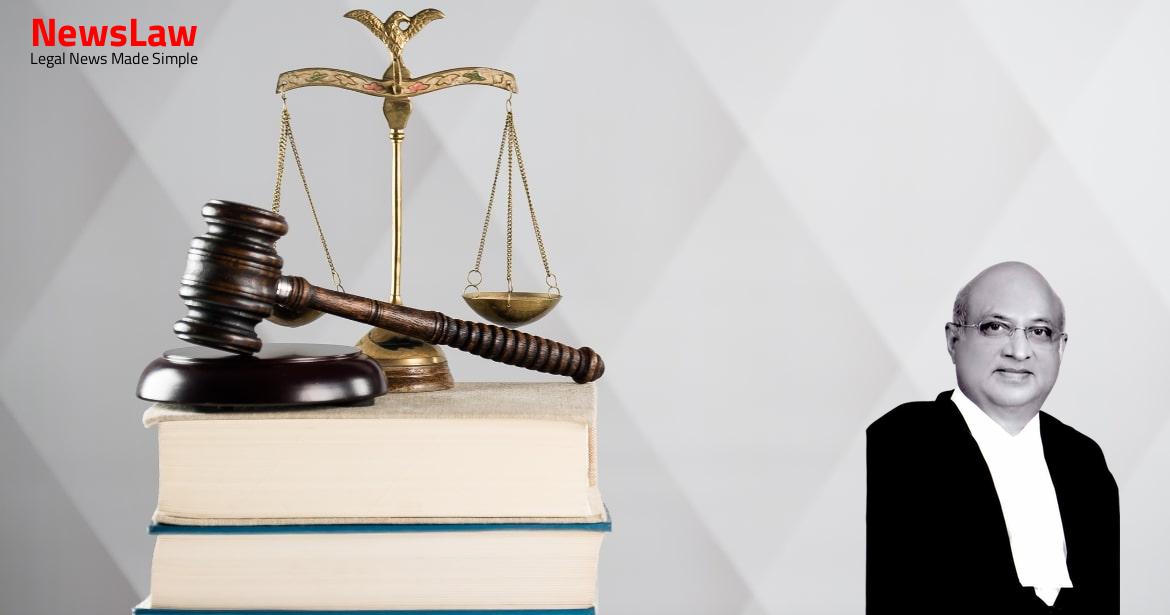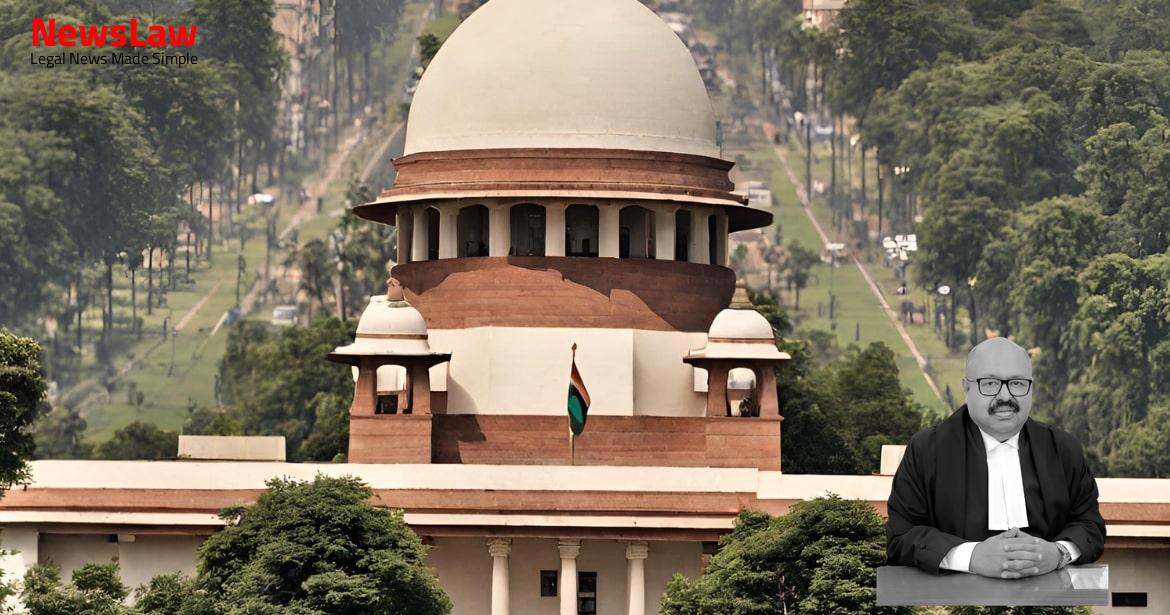Explore the intricate legal analysis surrounding an arbitrator’s ability to award interest in contracts. Dive into the complexities of the law and its implications on dispute resolution. This case delves into the interpretation of clauses, statutory provisions, and precedents to determine the scope of an arbitrator’s authority regarding interest payments. Let’s unravel the legal intricacies together.
Facts
- Parties entered into a contract on 24.10.2008 which contained an interest barring clause.
- The clause specified that no interest shall be payable by BHEL on various amounts including Earnest Money Deposit and Security Deposit.
- Disputes arose between the parties regarding the contract.
- Appellant filed a petition under Section 11 of the Arbitration and Conciliation Act, 1996 before the Delhi High Court.
- The Court appointed Hon’ble Mr. Justice M.A. Khan (Retd.) as the sole Arbitrator.
- Appellant claimed various amounts under different heads and also claimed interest on the value of the award.
- Appellant’s bid for the project was accepted by the respondent, who issued a Letter of Intent (LOI) dated 09.09.2008.
- The Arbitrator awarded pendente lite and future interest at the rate of 10% p.a. to the appellant on the award amount from the date of filing of the claim petition i.e. 02.12.2011 till the date of realization of the award amount.
- The respondent challenged the award under Section 34 of the 1996 Act before the Delhi High Court in O.M.P. (COMM.) 28/2017, arguing that pendente lite interest was expressly barred in the contract.
- The Single Judge held that pre-award interest includes both pre-reference interest and pendente lite interest.
- The Single Judge set aside the award of pendente lite interest as it was considered not prescribed by the contract clause.
- The Division Bench of the High Court upheld the Single Judge’s decision.
- The present appeal is against the High Court’s denial of pendente lite interest on the award amount to the appellant.
- The case involves a tender for the construction of a boundary wall at a power project in Bawana, Delhi, by the respondent.
Also Read: Analysis of High Court’s Dismissal of Second Appeal
Arguments
- The appellant argued that the Arbitrator’s decision regarding the payment of interest for the pendente lite period was plausible based on Clause 17 of the Contract.
- It was contended that Clause 17, which bars payment of interest to the contractor, is ultra vires and goes against Section 28 of the Indian Contract Act, 1872.
- The respondent’s counsel argued that Section 31(7)(a) of the 1996 Act prioritizes the contract between parties and limits the arbitrator’s power to award interest if the contract expressly prohibits it.
- Reference was made to the case of Raveechee and Company v. Union of India to support the argument against granting pendente lite interest if the contract bars it.
- The respondent’s counsel distinguished the Ambica Construction case by stating it was decided under the Arbitration Act, 1940, not the 1996 Act.
- Section 3 of the Interest Act allows for interest in debt recovery proceedings, but also recognizes parties’ right to contract out of interest payment.
- It was argued that Clause 17 of the Contract is in line with this provision and not in violation of the Indian Contract Act, 1872.
- Based on these arguments, the respondent’s counsel requested the appeal to be dismissed.
Also Read: Land Sale Agreement Appeal: Legal Consideration of Additional Evidence
Analysis
- Contracts where parties have agreed to resolve disputes through arbitration are saved under Exception I to Section 28.
- The 1996 Act gives importance to the contract between parties and limits the arbitrator’s power to award pre-reference and pendente lite interest if parties have agreed otherwise.
- Section 31(7)(a) of the 1996 Act deals with payment of interest and allows parties to waive interest claims including pendente lite.
- Exception I to Section 28 saves contracts that refer disputes to arbitration from being rendered illegal.
- Section 31(7)(a) of the 1996 Act allows parties to waive interest claims, and the arbitrator’s power to grant interest is subject to parties’ agreement.
- Interest payments are governed by the Interest Act, 1978 and specific statutes relevant to the matter.
- The Interest Act defines ‘Court’ to include Tribunals and Arbitrators, and allows for interest to be granted at prevailing rates.
- Section 31(7)(a) of the 1996 Act provides for the arbitrator’s power to award interest.
- Section 28 of the Contract Act voids contracts that restrict parties from enforcing their rights in court or limit the time to enforce rights.
- If a contract expressly bars payment of interest, the arbitrator cannot grant pendente lite interest.
- The judgment in Ambica Construction under the Arbitration Act 1940 does not apply to cases under the 1996 Act.
- Section 3(3) of the Interest Act, 1978 allows parties to waive their claim to interest through agreement.
- Section 3(3)(a)(ii) exempts situations from the Interest Act where interest payment is barred by an express agreement.
- Clause 17 of the Contract is not ultra vires in terms of Section 28 of the Indian Contract Act, 1872.
- Agreement to refer the matter to arbitration does not violate Section 28 of the Contract Act.
- No cause of action accrues until the Arbitrator makes the award in such arbitration.
- If the contract prohibits pre-reference and pendente lite interest, the arbitrator cannot award interest for that period.
- In this case, the clause barring interest is clear and categorical.
- If the contract bars interest, the arbitrator cannot award interest from the date of cause of action till the date of the award.
- The High Court’s rejection of the claim for pendente lite interest on the award amount was justified.
- The judgment in State of Orissa v. G.C. Roy (1992) 1 SCC 508 is relied upon.
- The expression ‘any moneys due to the contractor’ includes the amount awarded by the arbitrator.
- In Sayeed Ahmed and Company v. State of Uttar Pradesh & Ors., the words ‘any amount due to the contractor by the employer’ were discussed and not considered ejusdem generis with earlier words like ‘earnest money’ or ‘security deposit’.
- The judgment in Sri Chittaranjan Maity v. Union of India was with reference to the 1940 Act.
- In Ambica Construction v. Union of India (2017) 14 SCC 323, it was highlighted that a mere bar to award interest on contract amounts does not deny payment of pendente lite interest.
- The case of Bharat Heavy Electricals Limited v. Globe Hi-Fabs Limited highlighted distinctions between provisions in the 1940 Act and the 1996 Act regarding the arbitrator’s ability to award interest.
- The decision in Raveechee and Company was under the Arbitration Act 1940 and not applicable to the present case.
- In Sree Kamatchi Amman Constructions v. Divisional Railway Manager (Works), Palghat & Ors., specific aspects related to the case were discussed.
- Clause 17 of the contract is not ultra vires according to Section 28 of the Indian Contract Act, 1872.
- When parties have express statutory permission to contract out of receiving interest and do so without any vitiation of free consent, the Arbitrator cannot grant pendent lite interest.
Also Read: Legal Analysis in Compensation Appeal Case
Decision
- The appeal failed and was dismissed
- The parties are directed to bear their own costs
Case Title: GARG BUILDERS Vs. BHARAT HEAVY ELECTRICALS LIMITED (2021 INSC 606)
Case Number: C.A. No.-006216-006216 / 2021



